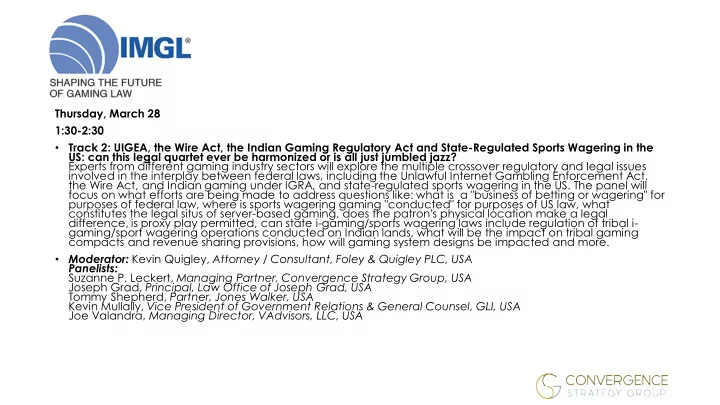

Thursday, March 28 1:30-2:30 Track 2: UIGEA, the Wire Act, the Indian Gaming Regulatory Act and State-Regulated Sports Wagering in the • US: can this legal quartet ever be harmonized or is all just jumbled jazz? Experts from different gaming industry sectors will explore the multiple crossover regulatory and legal issues involved in the interplay between federal laws, including the Unlawful Internet Gambling Enforcement Act, the Wire Act, and Indian gaming under IGRA, and state-regulated sports wagering in the US. The panel will focus on what efforts are being made to address questions like: what is a "business of betting or wagering" for purposes of federal law, where is sports wagering gaming "conducted" for purposes of US law, what constitutes the legal situs of server-based gaming, does the patron's physical location make a legal difference, is proxy play permitted, can state i-gaming/sports wagering laws include regulation of tribal i- gaming/sport wagering operations conducted on Indian lands, what will be the impact on tribal gaming compacts and revenue sharing provisions, how will gaming system designs be impacted and more. Moderator: Kevin Quigley, Attorney / Consultant, Foley & Quigley PLC, USA • Panelists: Suzanne P. Leckert, Managing Partner, Convergence Strategy Group, USA Joseph Grad, Principal, Law Office of Joseph Grad, USA Tommy Shepherd, Partner, Jones Walker, USA Kevin Mullally, Vice President of Government Relations & General Counsel, GLI, USA Joe Valandra, Managing Director, VAdvisors, LLC, USA
Why are We Talking about Sports Betting? • Repeal of PASPA paved the way for legalization of sports betting • With the large-scale expansion of casino gaming across the United States, casino revenues are flattening out in many markets, including tribal markets. • Operators are looking to expand their product offerings in order to draw in customers and their spending. • State legislators want to assist casino gaming enterprises in remaining competitive (read: protect revenue stream), to generate additional revenues for the states, to shut down illegal markets, and to respond to the will of the people. • RESULT: 32 states (at least) have either passed or are considering legislation to permit sports betting
Types of Sports Betting • Illegal • Local “bookie” • Off-shore websites • Legal (or potentially legal) • Bricks-and-mortar Riverboat and land-based casinos • Tribal casinos • Racetrack casinos • Off-track betting parlors • Video poker truck stop casinos • Restaurant/bars • Lottery outlets • Stand-alone betting shops • • Online On-site at brick and mortar casinos • Geo-location to limit bets to property (MS Choctaw) • Mobile • Licensed to brick and mortar casinos (NV and NJ models) • Lottery (IL, • Independent online betting companies (MA – FanDuel, DraftKings) •
Why Online Sports Betting? • Pros: • Greatest potential to compete with illegal market • Place bets from anywhere, taking away incentive to place bets on illegal sites • Consumer protection • More revenue for casino operators, tribes, and States (tax revenue) • Bricks and mortar casinos able to offer more gaming options to customers, capturing higher share of play • Mobile can be 50-70% of sports betting • Cons: • No existing regulatory framework • What works in New Jersey or Nevada may not be for Kansas and Louisiana • Dilution of market share • More than 50% of sports bets likely online, therefore bricks and mortar locations may not be as competitive • Customer preferences and acceptance • Widespread acceptance isn’t guaranteed. New Jersey is potentially the exception, not the rule.
What will be the impact on tribal gaming compacts and revenue sharing? • Revenues • Low revenue potential when compared with casinos • Wagers DO NOT equal revenues • Low margin business Hold percentage around 5% of wagers, on average • Operating costs of bricks and mortar – approx. 50% of GGR • $100 wager = $5.00 in GGR; $2.50 in operating costs; $2.50 remaining for taxes, profit • • Est. $58 billion wagered on NFL and college football games in the U.S. annually $2.9 billion in revenues (GGR) • • By comparison – commercial gaming generated $40 billion in GGR in 2017 (American Gaming Association), and tribal gaming generated $31.5 billion in GGR in 2016 (Meister) • Highest potential is with online and mobile wagering • 56% of wagers in the U.K.; 70% of wagers in New Jersey Both have retail locations close to the population • • Many tribal casinos not close to the population Without mobile, tribes lose out on potential bets •
Impacts on Tribal Revenues? • Successful operations will hinge on • Public demand • Where will public demand be high? • Disposable incomes • Ability to tap into the entire market • Without mobile, can only capture 30-50% of potential wagers • Successful operations could • Protect casino gaming revenues • Add new sports betting revenues – increase revenues by as much as 7%
Recommend
More recommend